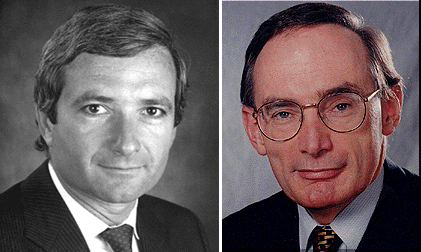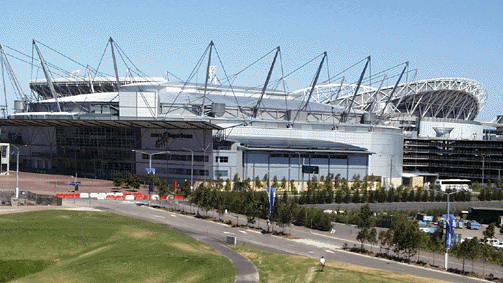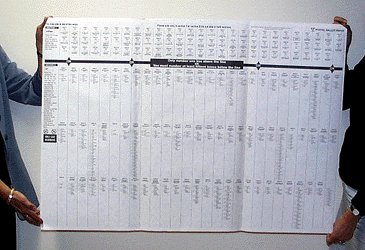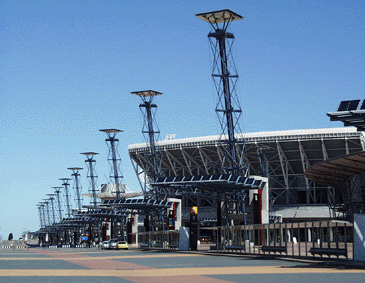Economic Rationalism, Social Issues and Changing Attitudes
 New South Wales into the nineties: Premiers Nick Greiner (left) and Bob Carr (right)
New South Wales into the nineties: Premiers Nick Greiner (left) and Bob Carr (right)
In the last decade of the century little remained unchanged. In March 1988, the Labor Government led by Barry Unsworth was defeated ending Labor’s 12 years in office. One of the issues contributing to the defeat was Unsworth’s stand on increased gun control, demonstrating the apparent dangers of such reform attempts. In 1996, though, after the Port Arthur Massacre, the New South Wales Parliament was the first to fully back a national gun control program which now had overwhelming popular support.
The political scene was undergoing rapid change in concert with economic change. The new Liberal-National Party Government elected in 1988 and led by Nick Greiner, focussed strongly on economic management and anti-corruption issues. Guided by now dominant economic rationalist principles, they moved towards increased corporatisation or privatisation of public assets and businesses; and introducing efficiency-focussed cuts and private enterprise-style appointment, management and accounting systems to the public service. The size of Parliament was reduced and the ICAC (the Independent Commission Against Corruption) established. Ironically, the latter was the cause of the Premier’s resignation in 1992. The election of March 1991 resulted in NSW’s first minority government for many decades, the LNP holding power through an agreement with four Legislative Assembly Independents. In this vulnerable period, a number of reforms of the Parliament were led by the Independents including a proposal for Fixed Term 4 year Parliaments which was supported at the Referendum of 1995.
The Independents also played a role in establishing a long-running Police Royal Commission which exposed many problems and individuals, diverted into a controversial paedophile inquiry, and led to significant reforms of the Police Service.
Greiner resigned as Premier in June 1992 to be replaced by John Fahey. At the elections of March 1995, the Labor Party led by Bob Carr, won a narrow victory which was greatly consolidated at the next election in 1999. The Fahey government had already modified the economic policies which were causing considerable controversy in many sectors of the community (although strongly supported in others) and the Labor government attempted to further balance social programs with financial restraint and the demands placed on the state budget by the upcoming Sydney 2000 Olympics.
 Part of the Sydney 2000 Olympics site at Homebush, February 2000
Part of the Sydney 2000 Olympics site at Homebush, February 2000
The gaining of the Olympic Games for Sydney in the Year 2000 was a triumphal moment for the Fahey government and it dominated much government activity in the years to follow. Preparations and implementation of the massive construction program proceeded well on schedule, but funding issues and recurring controversy dogged the process. Sydney, although effected by the major downturn of Asian economies in late 1997 through to mid 1999, had become a major tourist destination which, together with the Olympics, brought a boom in hotel, sports and public facilities, business and premium housing construction. The state had also become a major financial centre.
Federally, the economic restructuring commenced under the Hawke and then Keating Labor Governments massively changed the Australian economic scene and this was accelerated by the Liberal Government led by John Howard which won office in 1996 and set out to downsize the public sector. The internationalising and restructuring of the economy greatly accelerated and brought both benefits and painful social and economic costs. Industrial policies shifted away from arbitration and union representation towards collective bargaining and individual contracts. By century’s end, the New South Wales economy overall seemed buoyant and resilient despite important concerns in agriculture, resources and manufacturing, highlighted, for example, by the closure of the BHP steel works in Newcastle.
The States were affected by Federal financial constraints and the financial relationship worsened in 1997 when a major source of state taxes was declared unconstitutional by the High Court. These were consequently to be collected by the Federal Government on their behalf, further reducing state independent action. The introduction of a national Goods and Services Tax (GST) in 2000 has been welcomed by state governments as it promises to put an end to a long-running issue of inadequate state returns from Commonwealth revenues.
Popular cynicism about politics and politicians continued to be a feature of Australian attitudes despite the continued success of the democratic system. Reaction was highlighted by the rise of anti-immigration parties, changes in voting patterns, and the increase in Independents in lower houses. In upper houses the increase in minor parties also suggested a more discriminating use of the ballot by voters as well as some disenchantment with the major political parties. On the other hand, concern that significant numbers of citizens, especially youth, may be tending to withdraw from participation, and that this could undermine the institutions of democracy themselves, led in late 1990s to Civics and Citizenship Education programs being implemented throughout Australia to improve understanding of civic institutions and encourage informed, active, participative citizenship.
A Changing Legislative Council
 For more than 4 million New South Wales voters, the 1999 ballot paper for the Legislative Council
was fairly challenging. The table-cloth sized voting paper, possibly the world’s largest, demonstrated that interest in running for political office was alive and well in New South Wales
For more than 4 million New South Wales voters, the 1999 ballot paper for the Legislative Council
was fairly challenging. The table-cloth sized voting paper, possibly the world’s largest, demonstrated that interest in running for political office was alive and well in New South Wales
In recent years, the Legislative Council has been making far more day-to-day input and impact on the processes of parliament and government than it has had in its long history. The reasons for this relate to the changes to its electoral system.
The 1978 democratising of the Legislative Council effectively gave the Council more authority as it could now claim to be elected as a result of the will of the people, as only the Legislative Assembly could previously. The 1978 changes meant that 15 of its 45 Members would be elected at each general election (originally three years but four after 1981). As Members were elected proportionally across the whole state, this effectively meant that to be elected a candidate needed a quota of about 6.5% of the total vote, immediately making it easier for smaller parties to gain representation while reducing representation of the larger parties. Since 1988, by when the changes had worked their way through, no party (government or opposition) has held a majority in the Chamber.
The 1991 reduction in size from 45 to 42 and the reduction in term from 12 years to 8, meant that 21 Members would now be elected at each general election, further reducing the quota for election to about 4.5%. This immediately led to an increase in the number of “cross bench” Members from smaller parties and a further decrease in those from major parties. Both candidates and voters have recognised this difference and at the 1999 elections, 264 candidates and 80 parties contested the 21 seats on offer and 35% of primary votes went towards smaller parties. The resulting Legislative Council consisted of 38% of Government (Labor) Members; 31% Opposition Members (Liberal and National parties); and 31% Cross benches (smaller parties and independents). There are 12 different political groupings and two independents represented in the Legislative Council, as opposed to 3 political groupings and five independents in the Legislative Assembly.
The result is that wide ranging community opinion and viewpoints are constantly heard in the Council. In addition, the system has led to a gender and ethnic/cultural balance that is more representative of the people of New South Wales. The electoral system used for the lower house, the Legislative Assembly, usually ensures stable government by allowing one of the major political group to have ‘the numbers’. Since the traditional role of the Council is as a ‘House of Review’, it can be argued that this more diverse reflection of the community is very suited to that role as it does not simply repeat the party endorsement given to a bill in the lower house. In addition, the role of Parliament in reviewing executive government could be seen to be undertaken with more impact than in a lower house where the executive government dominates. The Legislative Council can amend most legislation but cannot prevent an elected government carrying out its programs by refusing funds. It can, however, review the programs and highlight perceived problems.
Some ministers are also selected from the Legislative Council – after the 1999 elections five Ministers out of the 21 came from the Council, an unusually high number. In addition, private Members can initiate legislation and, given that the government does not dominate the House and private members’ bills have a chance of being passed. As a result of both these factors increasing numbers of bills are proposed and passed in the Upper House. In such cases, the Lower House becomes the House of Review and, since the government has the numbers there, legislation will not ultimately pass unless it finds Government support.
Into the Millennium
 Homebush, Sydney 2000.
Homebush, Sydney 2000.
A complex mix of social and political attitudes and economic directions prevails at the millennium. Some disenchantment with politicians and existing political parties coexists with increased political participation in the institutions of government. Few citizens chose not to vote and many seek to express their views through the political institutions.
The new economic directions and privatisation undertaken by most governments is not without support and a greater percentage of Australians own shares than in any other country . Yet there is a renewed demand for effective social policy. Amongst the grand new structures and monuments of Sydney at the millennium and the eve of the Olympics and the centenary of Federation, await problems as well. Homelessness; drugs; problems in health services and education; concerns about security; agricultural crises; the running down of services in rural communities; issues of reconciliation and land rights with indigenous Australians; transport inadequacies; major environmental concerns; some resurgence of racist or at least anti-immigration attitudes; republicanism and constitutional change; and more, all require the concentrated attentions of governments. For all the economic changes, globalisation and attention to reducing government participation, the need social management by governments is at least as strong as ever. The role of parliament remains fundamental: as the means of expressing of the people’s will, ensuring the rule of law, balancing and monitoring the actions of executive government (and to a lesser extent the courts) and keeping the people central to the system of government.
